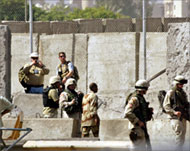The great walls of Iraq
A new form of architecture is dotting urban centres throughout Iraq, but it is not the type Iraqis say they can be proud of.

Tonnes of reinforced concrete walls overlooking man-made mountains of sand bags are being systematically erected around government offices, party headquarters, senior officials’ houses and police stations.
Many of the walls can be found around US and Iraqi army outposts in Baghdad, Falluja, Mosul, Ramadi and other cities in Iraq.
The walls have created traffic congestion in the capital and are resented by many Iraqis.
“It is worse than the Berlin Wall,” said Muaffaq al-Khafaji, a construction engineer from Baghdad.
“It represents a slow death of the capital and it does not seem to be reaching an end in the near future. Not mentioning the abuse to the beauty of the city.”
Unavoidable
But security officials say the walls are crucial and unavoidable given Iraq’s volatile security situation.
|
“It represents a slow death of the capital and it does not seem to be reaching an end in the near future. Not mentioning the abuse to the beauty of the city” Muaffaq al-Khafaji, construction engineer from Baghdad |
“The protective walls are of a great necessity to the security of the country in protecting the leadership areas and offices,” said Captain Tariq al-Heeti of al-Anbar’s police force.
When asked whether the walls had an adverse effect on Iraqis, al-Heeti said: “But that is the sacrifice we must all contribute for establishing peace and order. If you want to do something, you must sacrifice another.”
Congestion
The walls have proven to be obstacles for many commuters, including emergency response units who often have to navigate the concrete maze at breakneck speeds.
A Baghdad civil defence officer says the walls made it more difficult to reach the Shorja market which went up in flames on 19 April, ruining businesses and causing several million Iraqi dinars in damages.
“It was so difficult for our vehicles to reach the site, and the delay they caused simply led to a disaster,” he said on the condition of anonymity.
A similar fire hit the market area in al-Jumhuriya Street in September.
Other Iraqis proposed military installations should be moved into the US-administered Green Zone, which is heavily fortified.
Mohammed Mohammed, a civil engineer, formerly a member of the Iraqi Engineers Guild, called on all military installations to be moved away from populated areas.
Unabated violence
However, attacks have targeted non-military installations as well and may prove the use of the walls does not prevent violence.
 |
|
Bombers have begun attacking in |
On 2 November 2004, a car bomber struck a concrete wall protecting the Ministry of Education in Baghdad’s Adhamiya district.
Eight people were killed.
In February 2005, a car bomber killed 125 when he struck a market in Hilla, 100km south of Baghdad.
Last week, a similar attack outside a hospital in Mahmudiya, 30km south of Baghdad, killed 30 people.
Multiple car bombers
Ahmed Al-Easawi, a former general who is now head of security of the Falluja Governing Council, believes those carrying out car bomb attacks have found ways to circumvent the use of protective walls.
In the past few months, the use of multiple car bombers has become prevalent.
He pointed to the use of three truck bombers in an attack on a fortified compound in the Palestine and Sheraton hotels in Baghdad on 25 October.
“One bomber was used as a diversion while the second attempted to take down the protection wall and a third was expected to ram through the opening left by the second explosion,” he explained.
A US soldier killed the third driver.
Fifteen people were killed in that attack, but the toll could have been considerably higher.
Cities surrounded
Although security walls have produced mixed results in preventing attacks, they are still being applied to cities where anti-US attacks have been on the increase.
|
“One bomber was used as a diversion while the second attempted to take down the protection wall and a third was expected to ram through the opening left by the second explosion” Ahmed Al-Easawi, Falluja Governing Council security chief |
Falluja in November 2004 was a test case where entry into and exit from the city were restricted by the use of security walls, sandbag barricades and a heavy police presence.
All Falluja residents returning to the war-ravaged city were issued identity cards carrying retinal scan information.
Other cities – Samarra and Ramadi – have also implemented similar measures.
The combination of such security measures, in addition to razor wire surrounding conflict areas, has raised resentment among Iraqis who compare their situation to the siege of occupied Palestinian towns by Israeli forces.
Secret manufacturers
The manufacturers of the concrete walls are not known.
In previous months, trailers carrying their concrete cargo crossed from the Jordanian border and were often targeted by unknown armed groups along the 500-km expressway.
Recently, however, a security official who spoke on the condition of anonymity said Iraqi factories had started mass producing the concrete barriers.
Their locations, however, are guarded secrets for fear of attacks by anti-US and anti-Iraqi government forces.
US Department of Defence officials were unavailable to comment on this story.